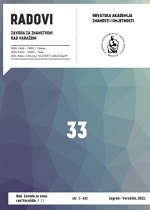MEHKA CENZURA TRDIH BESEDIL: OD TRDINOVIH SATIRIČNIH HRUŠK DO NACIONALISTIČNIH BAJK
SOFT CENSORSHIP OF HARD TEXTS: FROM TRDINA’S SATIRICAL “PEARS” TO NATIONALIST “FABLES”
Author(s): Marijan DovićSubject(s): Cultural history, Studies of Literature, Political history, Slovenian Literature, 19th Century
Published by: Hrvatska akademija znanosti i umjetnosti - Zavod za znanstveni rad Varaždin
Keywords: Slovenian literature; Janez Trdina; censorship; “Bajke in povesti o Gorjancih“ (Fables and Tales of the Gorjanci); “Hrvaški spomini” (Croatian Memoirs);
Summary/Abstract: Janez Trdina (1830–1905) is one of the most remarkable figures of Slovenian literature in the second half of the nineteenth century. His eclectic concept of literature, quarrelsome character, and radical political views—republicanism, anticlericalism, and above all (Slavic) nationalism—led to constant conflicts that were detrimental to his teaching and writing career. The two episodes in which Trdina most troubled the Slovenian public were more than thirty years apart. The first was in 1850 and 1851, when Trdina, still a student in Vienna, published “The Tale of the Golden Pear“ and “The Assessment of Slovenian Poets“, thoroughly shaking the cultural elite of the so-called old-Slovenians. The second followed in the 1880s, when the retired high school professor published “Fables and Tales of the Gorjanci“ and “Croatian Memoirs“ in the literary journals of Ljubljana. With his literary texts, which transcended genres and into which he wove his socially critical views, Trdina irritated many contemporaries: first the old-Slovenian notables from the circle of Janez Bleiweis, later above all the nobility, the Krainer Germans with their Slovenian allies, moralists and clerics. Trdina’s criticism did not remain on the abstract or principled level, but attacked directly, ad hominem (albeit in literary disguise): Trdina defamed the most prominent personalities without hesitation, and problems were imminent. If one disregards the ban on Ljubljanski zvon for students, Trdina’s texts were not subject to explicit censorship—but they were nevertheless affected by repressive mechanisms that can be described as soft censorship. After the first affair, Trdina remained virtually silent as a writer for three decades, while the second affair contributed decisively to the resignation of Fran Levec, the editor of Ljubljanski zvon, and the discontinuation of the liberal journal Slovan.
Journal: Radovi Zavoda za znanstveni rad Varaždin
- Issue Year: 2023
- Issue No: 34
- Page Range: 1-22
- Page Count: 22
- Language: Slovenian

